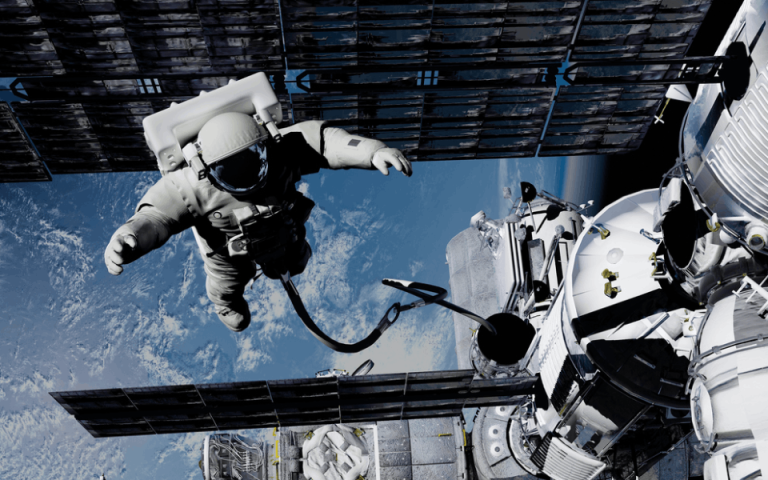Why can’t we send AI to space instead of humans?
12 April 2024
To mark the International Day of Human Space Flight, our MSc Astrophysics student Nishta Varma explores why we need humans in space. Read the blog below!

As we step into the realm of the fifth industrial revolution, driven by robotics, artificial intelligence, and machine learning, a pressing question appears: do crewed space missions still hold relevance?
Crewed space missions are more expensive and dangerous. This leads some people to argue that robotic spacecrafts, which are more cost-effective, can outperform humans. However, what implications does this have on a scientific forefront rather than economic? Follow me along, as I try to paint a picture of why human space flight is still relevant.
We’ve all seen videos of robots failing to replicate simple tasks like distinguishing between colors, holding a conversation, or recognising animals. What is a simple intuitive task that toddlers can perform takes hundreds of lines of code for a robot.
Whereas computational tasks like maths, data analysis, and statistics can be performed in a jiffy through AI. This disparity, which I studied about in my Machine Learning course, called Moravec’s paradox, forms the crux of my argument in this essay.
Space is unpredictable, there are asteroids, comets, solar storms, solar flares, and a variety of events that could easily damage space crafts. Handling these effects is where the magic of the human problem-solving brain comes into play.
Unlike our robotic counterparts, humans possess the ability to improvise and innovate in response to unforeseen challenges. We are equipped with the intuitive skills to troubleshoot issues on the fly and learn from our mistakes. Whether it's tinkering with equipment or brainstorming solutions, our ability to think creatively in the face of adversity is unparalleled.
Robots on the other hand lack intuitive and adaptive qualities. They can only perform tasks they are trained to do, and we cannot possibly train them for every probable circumstance. Hence, the value of having humans in space.
If that wasn’t convincing enough, there's more! Think about the sheer complexity of space missions, where every second counts and every decision matters. Now imagine being out there for years, with communication delays of up to 20 minutes or more. In such situations, having humans onboard becomes essential.
And let's not forget about the incredible research opportunities that space offers. From studying the effects of zero gravity on the human body to conducting experiments in a microgravity environment, humans bring a unique perspective to scientific exploration.
What we've learned about the human body in space, such as the rapid deterioration of bones and muscles, holds promise for improving healthcare on Earth. Furthermore, moving potentially hazardous research off the planet could safeguard Earth's biosphere.
Our presence in space opens a world of possibilities, offering insights that simply can't be gained from robotic missions alone.
But perhaps, most importantly, there's the undeniable sense of adventure that comes with human spaceflight. We're explorers at heart, driven by an insatiable curiosity to uncover the mysteries of the universe. It's akin to gazing at pictures of a beautiful beach versus actually feeling the sand between your toes and hearing the waves crash against the shore. Similarly, while data may offer valuable insights, there's an innate desire within us to physically experience the vastness of space firsthand.
Nishta Varma
MSc Astrophysics student (Department of Physics and Astronomy)
 Close
Close

